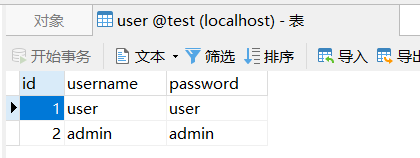第一步,引入pom
<parent><groupId>org.springframework.boot</groupId><artifactId>spring-boot-starter-parent</artifactId><version>2.1.4.RELEASE</version><relativePath/> <!-- lookup parent from repository --></parent><dependencies><dependency><groupId>org.springframework.boot</groupId><artifactId>spring-boot-starter-web</artifactId></dependency><dependency><groupId>org.springframework.boot</groupId><artifactId>spring-boot-starter-test</artifactId><scope>test</scope></dependency><!-- springBoot JPA的起步依赖 --><!-- https://mvnrepository.com/artifact/org.springframework.boot/spring-boot-starter-data-jpa --><dependency><groupId>org.springframework.boot</groupId><artifactId>spring-boot-starter-data-jpa</artifactId></dependency><!-- MySQL连接驱动 --><dependency><groupId>mysql</groupId><artifactId>mysql-connector-java</artifactId><version>5.1.35</version></dependency></dependencies>
第二步,创建User的pojo
数据库

package com.hikktn.entity;import javax.persistence.*;import java.io.Serializable;/*** @ClassName UserEntity* @Description TODO* @Author lisonglin* @Date 2021/4/2 15:41* @Version 1.0*/@Entity@Table(name = "user", schema = "test")public class UserEntity implements Serializable {@Id@GeneratedValue(strategy = GenerationType.IDENTITY)private int id;private String username;private String password;@Id@Column(name = "id")public int getId() {return id;}public void setId(int id) {this.id = id;}@Basic@Column(name = "username")public String getUsername() {return username;}public void setUsername(String username) {this.username = username;}@Basic@Column(name = "password")public String getPassword() {return password;}public void setPassword(String password) {this.password = password;}@Overridepublic boolean equals(Object o) {if (this == o) return true;if (o == null || getClass() != o.getClass()) return false;UserEntity that = (UserEntity) o;if (id != that.id) return false;if (username != null ? !username.equals(that.username) : that.username != null) return false;if (password != null ? !password.equals(that.password) : that.password != null) return false;return true;}@Overridepublic int hashCode() {int result = id;result = 31 * result + (username != null ? username.hashCode() : 0);result = 31 * result + (password != null ? password.hashCode() : 0);return result;}@Overridepublic String toString() {return "UserEntity{" + "id=" + id + ", username='" + username + '\'' + ", password='" + password + '\'' + '}';}}
第三步,实现接口
package com.hikktn.repository;import com.hikktn.entity.UserEntity;import org.springframework.data.jpa.repository.JpaRepository;import org.springframework.data.jpa.repository.JpaSpecificationExecutor;import java.util.List;/*** @ClassName UserRepository* @Description TODO* @Author lisonglin* @Date 2021/4/2 16:00* @Version 1.0*/public interface UserRepository extends JpaRepository<UserEntity, Integer>, JpaSpecificationExecutor<UserEntity> {// 查询全部List<UserEntity> findAll();}
第四步,测试
package com.hikktn.test;import com.hikktn.MySpringBootApplication;import com.hikktn.entity.UserEntity;import com.hikktn.repository.UserRepository;import org.junit.Test;import org.junit.runner.RunWith;import org.springframework.beans.factory.annotation.Autowired;import org.springframework.boot.test.context.SpringBootTest;import org.springframework.test.context.junit4.SpringRunner;import org.springframework.transaction.annotation.Transactional;import java.util.List;import java.util.Optional;/*** @ClassName JpaTest* @Description TODO* @Author lisonglin* @Date 2021/4/2 16:02* @Version 1.0*/@RunWith(SpringRunner.class)@SpringBootTest(classes= MySpringBootApplication.class)public class JpaTest {@Autowiredprivate UserRepository userRepository;@Testpublic void testGetUserAll(){List<UserEntity> users = userRepository.findAll();System.out.println(users);}@Testpublic void testAddUser(){UserEntity userEntity =new UserEntity();userEntity.setUsername("tom");userEntity.setPassword("123");userRepository.save(userEntity);}@Testpublic void testFindOneUser(){Optional<UserEntity> byId = userRepository.findById(1);System.out.println(byId.get());}@Testpublic void testDeleteUser() {userRepository.deleteById(5);}@Test@Transactional(rollbackFor = Exception.class)// @Rollback(value = false)//发生异常不回滚public void update(){Optional<UserEntity> optional = userRepository.findById(1);System.out.println(optional.orElseGet(UserEntity::new));}}
第五步,增删改查
package com.hikktn.controller;import com.hikktn.entity.UserEntity;import com.hikktn.repository.UserRepository;import org.springframework.beans.factory.annotation.Autowired;import org.springframework.data.domain.Page;import org.springframework.data.domain.PageRequest;import org.springframework.web.bind.annotation.*;import java.util.Optional;/*** @ClassName UserController* @Description TODO* @Author lisonglin* @Date 2021/4/2 22:01* @Version 1.0*/@RestController@RequestMapping(path = "/user")public class UserController {@Autowiredprivate UserRepository userRepository;@GetMapping(path = "/all")@ResponseBodypublic Iterable<UserEntity> getAllUsers(){return userRepository.findAll();}/*增加用户*/@PostMapping()public UserEntity saveUser(@RequestBody UserEntity user) {return userRepository.save(user);}/*删除用户*/@DeleteMapping("/{id}")public void deleteUser(@PathVariable("id") int userId) {userRepository.deleteById(userId);}/*修改用户*/@PutMapping("/{id}")public UserEntity updateUser(@PathVariable("id") int userId, @RequestBody UserEntity user) {user.setId(userId);return userRepository.saveAndFlush(user);}/*查询用户*/@GetMapping("/{id}")public UserEntity getUserInfo(@PathVariable("id") int userId) {Optional<UserEntity> optional = userRepository.findById(userId);return optional.orElseGet(UserEntity::new);}/*分页查询多个用户*/@GetMapping("/list")public Page<UserEntity> pageQuery(@RequestParam(value = "pageNum", defaultValue = "1") Integer pageNum,@RequestParam(value = "pageSize", defaultValue = "10") Integer pageSize) {return userRepository.findAll(PageRequest.of(pageNum - 1, pageSize));}}

